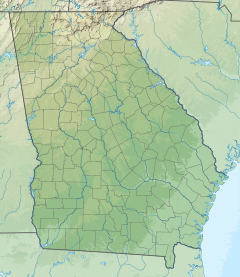 Front cover of the 1976 Masters Guide | |
| Tournament information | |
|---|---|
| Dates | April 8–11, 1976 |
| Location | Augusta, Georgia 33°30′11″N 82°01′12″W / 33.503°N 82.020°W |
| Course(s) | Augusta National Golf Club |
| Organized by | Augusta National Golf Club |
| Tour(s) | PGA Tour |
| Statistics | |
| Par | 72 |
| Length | 7,030 yards (6,428 m)[1] |
| Field | 72 players, 47 after cut |
| Cut | 150 (+6) |
| Winner's share | $40,000 |
| Champion | |
| 271 (−17) | |
| Location map | |
Location in Georgia | |
The 1976 Masters Tournament was the 40th Masters Tournament, held April 8–11 at Augusta National Golf Club in Augusta, Georgia.
Raymond Floyd won his only Masters title, eight strokes ahead of runner-up Ben Crenshaw.[2] He shot a 131 (−13) over the first two rounds,[3] then posted two rounds of 70 on the weekend to tie Jack Nicklaus' record of 271 (−17), set in 1965.[1] In the first three rounds, Floyd was under-par on every par-5, with eleven birdies and an eagle, and his 54-hole total of 201 (−15) was the lowest ever. Defending champion Nicklaus was the nearest pursuer, eight shots back at 209.[4] It was the second of Floyd's four major titles. Tiger Woods broke the 72-hole record by a stroke 21 years later in 1997 with 270 (−18), which was tied by Jordan Spieth in 2015.
Beginning with this Masters, a sudden-death playoff format was introduced, and originally planned to start at the first hole.[5] After three years without use, it was changed to begin on the 10th hole in 1979;[6] used for the first time that year, it ended on the eleventh green. In 2004, the playoff was changed to start on the 18th hole and then alternate with the adjacent 10th hole.[7] Prior to 1976, playoffs were full 18-hole rounds on Monday, and the last was won by Billy Casper in 1970. The first playoff in 1935 was the exception at 36 holes.
Floyd was the fourth wire-to-wire winner in Masters history, following Craig Wood in 1941, Arnold Palmer in 1960, and Nicklaus in 1972. The next was Jordan Spieth, 39 years later, in 2015.
- ^ a b Parascenzo, Marino (April 12, 1976). "Floyd enjoys a Sunday stroll". Pittsburgh Post-Gazette. p. 16.
- ^ Jenkins, Dan (April 16, 1977). "It was Ray all the way". Sports Illustrated. p. 18.
- ^ "Ray Floyd's 5-wood strangling Masters". Eugene Register-Guard. Oregon. Associated Press. April 10, 1976. p. 1B.
- ^ "Eight ahead, Floyd looks like a safe bet". Eugene Register-Guard. Oregon. UPI. April 11, 1976. p. 1C.
- ^ "Masters goes to sudden death". Sarasota Herald-Tribune. Florida. Associated Press. February 6, 1976. p. 2E.
- ^ "In sudden death, Masters playoff shifts to no. 10". Observer-Reporter. Washington, Pennsylvania. Associated Press. April 11, 1979. p. D2.
- ^ "Masters playoff format is changed". CNN.com. April 7, 2004. Retrieved April 7, 2013.

